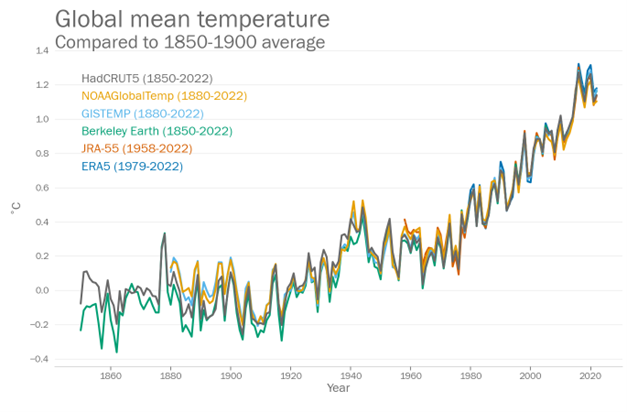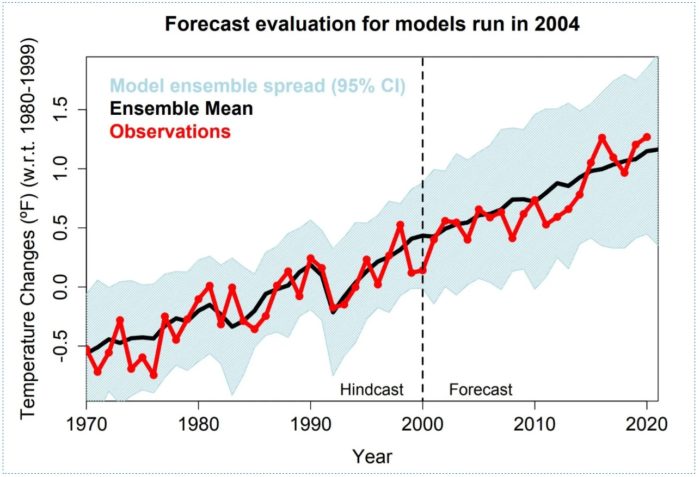Jan 03 2023
2015 to 2022 Eight Warmest Years on Record
 Happy New Year to all my readers.
Happy New Year to all my readers.
Early in each new year I like to see what the preliminary reports are for the climate over the past year. Final number crunching won’t be available for months, and it may take more than a year for the final tweaks to be reported and reviewed. But we do have a preliminary estimate of the temperature over the last year. The World Meteorological Organization reports:
The global average temperature in 2022 is estimated to be about 1.15 [1.02 to 1.28] °C above the 1850-1900 average. 2015 to 2022 are likely to be the eight warmest years on record. La Niña conditions have dominated since late 2020 and are expected to continue until the end of 2022. Continuing La Niña has kept global temperatures relatively «low» for the past two years – albeit higher than the last significant La Niña in 2011.
It looks like 2022 will be the fourth hottest year on record globally. Some specific locations had their warmest year, such as the UK and Spain (and perhaps most of Europe). As the WMO points out, we are in the middle of a La Niña cycle, which brings cooler temperatures globally. That is a short term fluctuation on the longer term trend. This also means that as we shift into an El Niño cycle we are likely to break new records.
I feel compelled to point all this out (as I am sure many scientists and science communicator will) because it is a critically important piece of information. But I also want to put it into a broader long term context. I have been engaged in skeptical activism now for 27 years, and followed many skeptical topics for longer than that. There is one extremely important pattern that emerges when you cover a topic for a long time – scientifically valid concepts tend to not only accumulate evidence but the evidence gets better and builds on itself. Meanwhile, pseudosciences do not display this pattern. They tend to go around in circles with low quality evidence. You can see this pattern across multiple disciplines.
This also gives us the opportunity to make long term predictions based upon whether or not we think a given discipline is scientifically valid. For example, skeptics of fake medicine such as homeopathy and acupuncture predicted that high quality definitive evidence in support of these claims would never emerge – and they haven’t. The same is true for ESP. If ESP were real, then after decades of research we should have seen some repeatable reliable research paradigm that demonstrates the effect. Instead we have a never-ending cycle of failed paradigms, that dazzle for a short period they evaporate under replication and close inspection.
Around 2000, when I started writing about the anti-vaccine community, proponents of the notion that mercury in vaccines caused autism predicted that once thimerosal was removed from the routine vaccine schedule, autism diagnosis rates would plummet. Skeptics like me predicted that they would not. They never did.
UFO believers (those who believe that the UFO phenomenon is caused by actual aliens visiting the Earth in their spaceships) have been predicting for decades that a major revelation is right around the corner. The aliens, they hypothesize, have just been grooming humanity for first contact, by teasing us with blurry photographs and mutilating cattle, but eventually they will reveal themselves. Or – they already have revealed themselves to the world governments, who in turn will go public with the information at some point (when we are presumably “ready”). Skeptics, meanwhile, predicted that UFOs will remain forever in the realm of blurry photos, stories coaxed out of hypnosis, ambiguous physical evidence, and other low grade evidence. In fact, this will continue to be the case despite the proliferation of cameras and videos that most people carry with them at all times. (And for the record, the Pentagon UFO evidence is also crap, with nothing compellingly alien.)
When it comes to climate change we have had a similar opportunity to compare different predictions based on different claims about the evidence. If we go back 10 or 20 years, the global warming deniers were claiming that warming had already “paused”, because it wasn’t really happening at all. We were just seeing relatively short term fluctuations that would eventually regress to the mean. Scientists, meanwhile, claimed that the pause was not even real, that it was just an artifact of evaluating recent data (trends don’t become statistically meaningful until you have enough data over enough time).
We therefore had two very different sets of predictions. Climate scientists predicted that warming would continue, that the decade from 2010 – 2020 would be the warmest on record, and the 2020s would then beat it. Climate change deniers predicted that the warming would stop followed by cooling as part of the natural environmental cycle. There has now been enough time to see how these two very different predictions faired. First, the pause was never real. It was always partly an artifact and partly a deception – deliberately starting with an unusually warm El Niño year in order to conceal later warming. Second, the warmest years on record continue to be the most recent years. Warming has not stopped.
There is no way to legitimately avoid the conclusion that the majority of climate scientists were correct and the climate change deniers were simply wrong. I do think this reality has moved the needle on public opinion and the political realities of climate change policy. It may be too little too late, but it is getting harder to deny reality. Some dedicated deniers have therefore shifted to – OK, the world it warming, but it’s a natural trend. Or – OK human activity is driving warming but it’s a good thing. OR – well, there’s nothing we can do about it anyway. But they never really give up denying that the warming is happening in the first place.
 They also try to play the same game, claiming that the predictions of climate scientists have been consistently wrong. But they are incorrect – they usually cite bad journalism or extreme activists, not the consensus of scientific opinion. Or they focus on the details that are hard to predict while denying the big picture. Or they simply lie. The fact is, climate models have been incredibly accurate in the aggregate, and are getting better as the models get more complex and computers more powerful. Again we have decades of predictions to validate the science of climate change.
They also try to play the same game, claiming that the predictions of climate scientists have been consistently wrong. But they are incorrect – they usually cite bad journalism or extreme activists, not the consensus of scientific opinion. Or they focus on the details that are hard to predict while denying the big picture. Or they simply lie. The fact is, climate models have been incredibly accurate in the aggregate, and are getting better as the models get more complex and computers more powerful. Again we have decades of predictions to validate the science of climate change.
We should not forget, nor let the climate change deniers off the hook, for their failed predictions of the past. Their predictions about future (now current) warming were wrong because their claims were wrong. Their entire process was wrong. They have always been engaged in a campaign of demonstrable denial – a suite of intellectual strategies meant to deny legitimate science rather than engage in valid discourse to find reliable answers.
While there is always somewhat of a continuum, on the topic of climate change there has culturally been two starkly different world-views, which made very different predictions about the future. One of those visions was correct and the other wrong.






